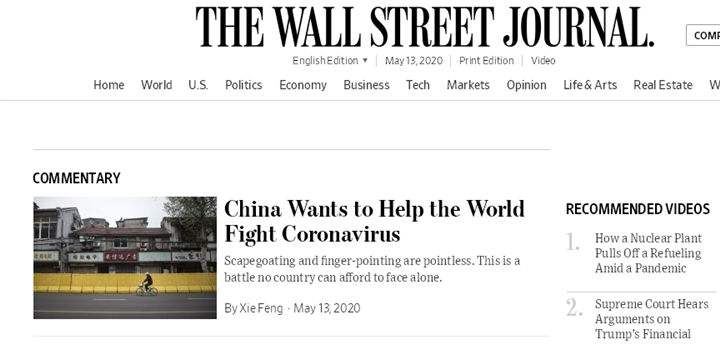5月13日,外交部駐香港公署特派員謝鋒在《華爾街日?qǐng)?bào)》網(wǎng)頁(yè)版發(fā)表英文署名文章,全文如下:
China Wants to Help the World Fight Coronavirus
中國(guó)致力于全球合作抗疫

In 1666, as bubonic plague swept Europe, residents of the tiny village of Eyam in England’s East Midlands elected to quarantine themselves in hopes of protecting neighboring communities. When the lockdown was lifted in November 1667, 260 of the approximately 800 residents had died, but the self-isolation worked. The illness was contained.
1666年,鼠疫席卷歐洲。在英國(guó)東米德蘭一個(gè)叫埃姆的小村莊,為保護(hù)鄰近城鎮(zhèn)不受感染,約800名居民選擇自我隔離。1667年11月隔離解除時(shí),共有260名居民為阻止疫病擴(kuò)散獻(xiàn)出了生命。
In early 2020, caught in the Covid-19 outbreak, Wuhan, a transport hub of 11 million people in China’s Hubei province, locked itself down for 76 days. Making tremendous sacrifice against all the odds, it created a strong first line of defense for China and the world.
2020年初,新冠肺炎疫情突然來(lái)襲。中國(guó)武漢,這座千萬(wàn)級(jí)人口的九省通衢之地,果斷封城76天,克服難以想象的困難,作出前所未有的犧牲,為中國(guó)和世界筑起了遏制疫情的第一道堅(jiān)實(shí)防線。
Covid-19 has thrust the world into uncharted territory. Among the countries hit by its first wave, China took a “closed-book exam,” with uplifting results that have informed other countries’ decision-making in the “open-book tests” that followed.
新冠病毒是一種全新病毒,不可能先知先覺(jué)。作為受到第一波沖擊的國(guó)家之一,中國(guó)率先參加“閉卷考試”,交出了令人鼓舞的答卷,為其他國(guó)家隨后的“開(kāi)卷答題”提供了重要參考。
While China never intends to export its system or model, its efficiency, spirit and sense of responsibility in the lifesaving battle against Covid-19 should be obvious. But some have started rumors that the coronavirus was produced synthetically in China. Social media amplifies these falsehoods. Tasuku Honjo, a Japanese Nobel Laureate from Kyoto University, was forced to issue a public statement denying that he had claimed the virus had been “manufactured in China.” Some American politicians touted evidence – none of which has been produced – that the novel virus originated in a Wuhan laboratory. But even the Trump administration’s own scientists, including Dr. Anthony Fauci, have dismissed such theories.
中國(guó)無(wú)意輸出自己的制度和模式,但在這場(chǎng)保衛(wèi)生命的戰(zhàn)“疫”中展現(xiàn)出來(lái)的中國(guó)效率、中國(guó)精神、中國(guó)擔(dān)當(dāng)有目共睹。然而,一些人無(wú)中生有地編造“新冠病毒是中國(guó)人工合成”的謠言,利用社交媒體散布。還有人將所謂“新冠病毒是中國(guó)制造”的謠言塞入日本諾貝爾獎(jiǎng)得主、京都大學(xué)教授本庶佑的口中,老先生坐不住了,專門發(fā)表聲明辟謠。一些美國(guó)政客聲稱掌握“病毒來(lái)自武漢實(shí)驗(yàn)室”的證據(jù),卻始終拿不出來(lái)。包括福奇在內(nèi)的多名美國(guó)政府科學(xué)家都批駁了這些歪理邪說(shuō)。
Identifying the virus’s origin is a serious scientific issue. It is up to scientists to research and draw evidence-based conclusions. Politicians shouldn’t meddle in the process, much less stigmatize others.
病毒溯源是嚴(yán)肅的科學(xué)問(wèn)題,應(yīng)由科學(xué)家進(jìn)行科學(xué)調(diào)查、基于事實(shí)和證據(jù)作出科學(xué)判斷。政客不應(yīng)肆意插手,更不應(yīng)搞污名化。
Outbreaks have occurred world-wide, and there is dispute about where the virus first appeared. A pneumonia of unknown origin with flulike symptoms was seen in some countries in late 2019. According to recent research by University College London’s Genetics Institute, the pandemic may have started sometime between Oct. 6 and Dec 11. A growing number of countries have found that their assumed “patient zero” had not traveled to China and that the local dominant strains of the virus are different from those in China.
這場(chǎng)疫情在全球多點(diǎn)暴發(fā),源頭不明,眾說(shuō)紛紜,迄無(wú)定論。2019年晚些時(shí)候,一些國(guó)家曾暴發(fā)癥狀與“流感”相似的不明肺炎。倫敦大學(xué)學(xué)院遺傳學(xué)研究所的最新研究顯示,疫情可能始于去年10月6日至12月11日之間。越來(lái)越多國(guó)家發(fā)現(xiàn)目前確定的“零號(hào)患者”沒(méi)有去過(guò)中國(guó),當(dāng)?shù)亓餍械牟《径局昊蛞才c中國(guó)并不相同。
China was the first to spot and report the outbreak, identify the pathogen, and share its genome sequence with the World Health Organization and the rest of the world. Yet China has been accused of coverups and delays and put in the dock. At the same time, those who failed to test, report and act in a timely fashion are passing judgment on others. Isn’t it a bit ironic?
中國(guó)發(fā)現(xiàn)疫情后,第一時(shí)間主動(dòng)報(bào)告,第一時(shí)間確定病原體,第一時(shí)間與世衛(wèi)組織和各國(guó)分享基因序列。但中國(guó)反而被污名為“隱瞞者”、“延誤者”,被推上被告席,而那些沒(méi)有及時(shí)檢測(cè)、報(bào)告、作為的卻成了審判者。何其荒唐!
As the timeline changes and possible cases are discovered in other countries that predate those found in China, some are anxious to shift the blame instead of reflecting on their own failures in the virus’s early days. Was it because they lacked the techniques, or perhaps a sense of responsibility? Could there have been any undercounting or even coverup? Should a country be labeled as the origin of the virus, held accountable and made to pay for others’ inept responses simply because it was the first to report what it found? If so, what country will be willing to test people and honestly report the findings in the future?
隨著各國(guó)發(fā)現(xiàn)比中國(guó)更早的病例、時(shí)間線不斷前移,有些人首先想到的是“甩鍋”推責(zé)、嫁禍于人,而不是檢討自身失誤。究竟是技術(shù)不行,還是缺乏責(zé)任心?是漏報(bào),還是瞞報(bào)?如果因?yàn)樽钕葓?bào)告就要被扣上病毒源頭的帽子,就要被追責(zé),就要替其他國(guó)家防控不力買單,今后還有哪個(gè)國(guó)家愿意積極檢測(cè)、誠(chéng)實(shí)報(bào)告?
Some are taking things further, trying to make a fortune out of the pandemic. They have demanded reparations from China, a chilling reminder of the Boxer Indemnity foreign powers coerced China into paying more than a century ago. As a Chinese proverb goes, “A gentleman pursues wealth in a righteous way.” Blackmail and plunder are surely not the correct response to a pandemic.
更有甚者,有些人想錢想瘋了,居然打起了發(fā)“疫情財(cái)”的算盤,企圖向中國(guó)“索賠”,復(fù)制100多年前列強(qiáng)逼迫中國(guó)“庚子賠款”的歷史。“君子愛(ài)財(cái),取之有道”。這樣赤裸裸的敲詐搶錢,與強(qiáng)盜何異?
Some others have seen the crisis as an opportunity to cut off trade and decouple economically from China. This has caused bottlenecks in global industrial supply chains and will only set back the recovery of frail economies.
還有人鼓噪趁著疫情對(duì)中國(guó)“斷供”、與中國(guó)“脫鉤”,人為制造全球產(chǎn)業(yè)鏈供應(yīng)鏈“梗阻”,這不啻是對(duì)本已垂危的世界經(jīng)濟(jì)致命一擊,給全球經(jīng)濟(jì)復(fù)蘇雪上加霜。
Fighting Covid-19 should be everyone’s first concern. The enemy is the virus. Scapegoating China will neither make up for the time that has been lost, nor save the lives that are at risk. We are teammates in this battle, not rivals. Countries need not compete with or envy each other, still less point the finger at or turn against one another. In fact, quite the opposite is necessary. We need to show sportsmanship and team spirit, give teammates who perform well a pat on the back, and lend a helping hand to those in need. After all, this is a fight nobody can afford to lose, one we must win together.
人命關(guān)天,抗疫為先,病毒才是真正的敵人。“甩鍋”中國(guó)彌補(bǔ)不了失去的時(shí)間,拯救不了瀕危的生命。在這場(chǎng)與病毒的角力中,我們不是對(duì)手,而是隊(duì)友。各國(guó)之間無(wú)需攀比嫉妒,更不應(yīng)指責(zé)埋怨、搞窩里斗、找替罪羊。相反,我們應(yīng)該發(fā)揚(yáng)公平公正的體育精神和齊心協(xié)力的團(tuán)隊(duì)精神,為表現(xiàn)出色的隊(duì)友點(diǎn)贊叫好,向需要幫助的伙伴伸出援手。因?yàn)椋谶@場(chǎng)較量中,沒(méi)有“你”輸“我”贏,只有“我們”共贏。
When disaster struck, people in Eyam and Wuhan made their heroic choices. They are the epitome of responsibility, self-sacrifice and solidarity. Such spirit defies time and space, transcends national, ethnic, religious and ideological boundaries, and inspires the international community to set aside prejudice and differences and unite as one. Not only has it kindled our hope of prevailing over the ongoing pandemic; but it will also light our way to a better future.
在人類遭受危難之際,埃姆和武漢人民作出了英雄的抉擇。他們勇于擔(dān)當(dāng)、自我犧牲、團(tuán)結(jié)互助的精神穿越時(shí)空,超越國(guó)家、種族、信仰和意識(shí)形態(tài),激勵(lì)著國(guó)際社會(huì)放下偏見(jiàn)、擱置分歧、同心同德。他們的精神不僅點(diǎn)燃我們最終戰(zhàn)勝疫情的希望,也照亮人類美好的未來(lái)。















